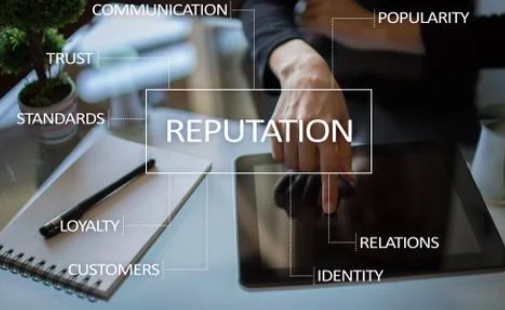You’ve graduated from college or earned your MBA. You’ve started your own business or got your dream job in a local company, or got another senior role in a multinational.
You are covered. That’s done.

But the next day, you dive right into the world of the hurried life, where in a matter of a few days, we can launch a new business.
A world, where in a matter of a few hours, we can start a powerful social media campaign.
A world, where one post on social media can travel around the globe in a matter of minutes and change the course of events in your personal or business life…
Every action you take, every word you communicate – can work for you OR against you. It can either boost your credibility, change some perceptions for the best or damage your reputation for months and even years.
So, what is this thing called reputation? And should you care about it?
Google it.
At the very least, you will find out a few very powerful quotes that stand out:
“Character is like a tree, and reputation like its shadow. The shadow is what we think of it; the tree is the real thing.” – Abraham Lincoln
“A brand is what a business does; reputation is what people remember” – Ted Rubin.
“It takes many good deeds to build a good reputation, and only one bad one to lose it.” – Benjamin Franklin.
No need to dig further. I think you get it.
The hard truth is that today, reputation is the measure or control of anything and everything that we do.
Whether you are an individual, an entrepreneur, a local company, or a giant like Amazon – your reputation matters.
A good reputation is built on trust, transparency, credibility, honesty and consistency.
And here is what you get with it:
- You attract better people, more businesses, and partners.
- You gain social recognition and influence.
- You provide more value to your customers.
- You gain trust and respect from various stakeholders.
- You have a solid and loyal customers-base.
- You set up for high expectations and growth from the market.
Today nearly all social or business interactions are established on the basis of the perceived reputation of both parties.
You are more likely to interact or do a business with someone who is known for a good reputation.
Good reputation has never hurt anyone.
A bad reputation can have a profound impact. Anything from financial losses, social justice, lost trust, to many hidden costs of reputational damage. Winning your [good] reputation back, is a near-impossible thing.
Whether you are a brand, company, or individual, you don’t have control of what people think. But you get to decide how you want to be seen and perceived.
Does it feel like a big challenge to shape public perception about you as an individual or a business? And then keep it that way?
It doesn’t really need to be so hard.
Start small. Use every social or business interaction to collect your reputation capital.
- Think about reputation as your asset. Daily.
- Be transparent and honest. Be humble. If you don’t have an answer to a question – be honest and say so. Not knowing everything in life is human. Admitting it will earn you even more respect and credibility.
- Challenge yourself on What and How you say to others. Are you being authentic, credible, open, respectful in your communication?
- Show empathy, especially in challenging times. Remind people that they’re not alone. Tell them you understand their struggles; create a bond. Build and develop your relationships further.
- Be trustworthy. Let people, business partners know what to expect. It is a powerful thing if you can trust yourself and be trusted by others.
- Emphasize the positive. In everything you do. Whenever you can.
- Know and show your unique and strong values. Talk about it. Demonstrate how it impacts your customers, partners, community.
- Get savvy online & on social media. Know your rules of engagement in social media. Listen and know what is being said about you, your business, and your products.
- Deliver on what you promised to do. And reserve the right to reassess your choices and change the course, if the business or environment is calling for it.
- Manage your [potential] top risks. Identify what are the areas of risk for you or your business. Start working on your risk assessment, develop your crisis response strategy with all available tools, or ask for external advice.
Your personality, business, leadership, services, and products make your reputation unique. Your audience, customers, partners don’t just come back for your ‘product.’ They engage with you or your business because of who you are.
When you’ve earned your good reputation, you’ve earned the ability to trade in your reputation capital for dazzling opportunities that will take you a long way.
Build your reputation. Make it bright and stand out.